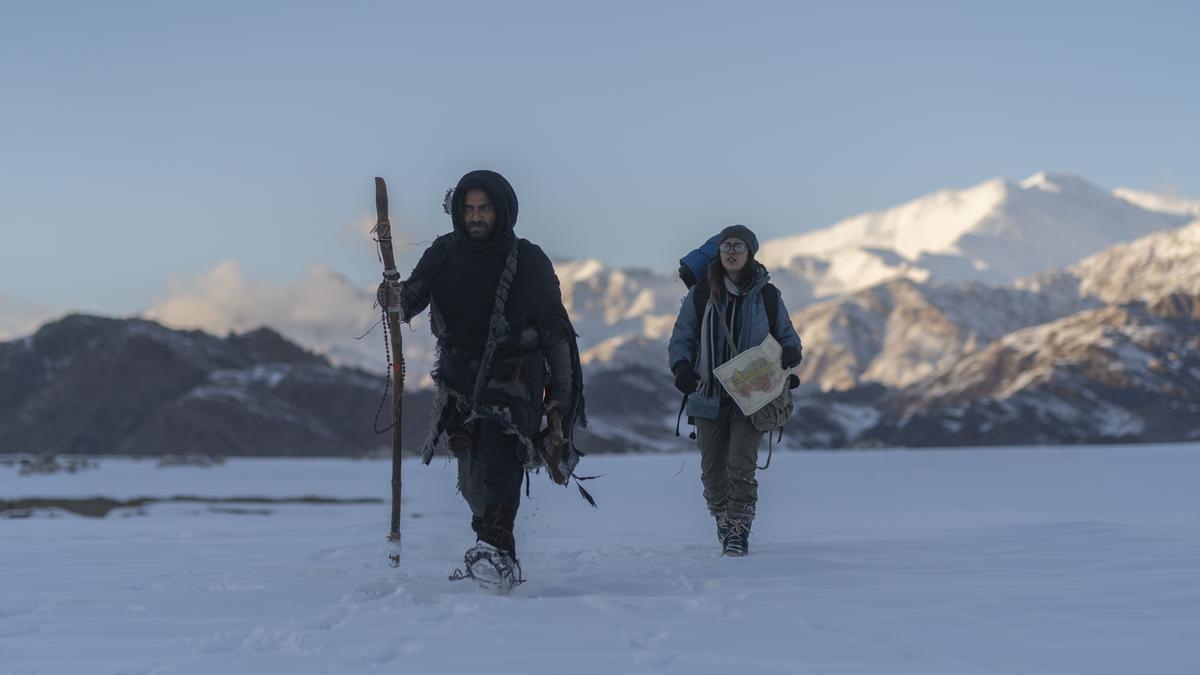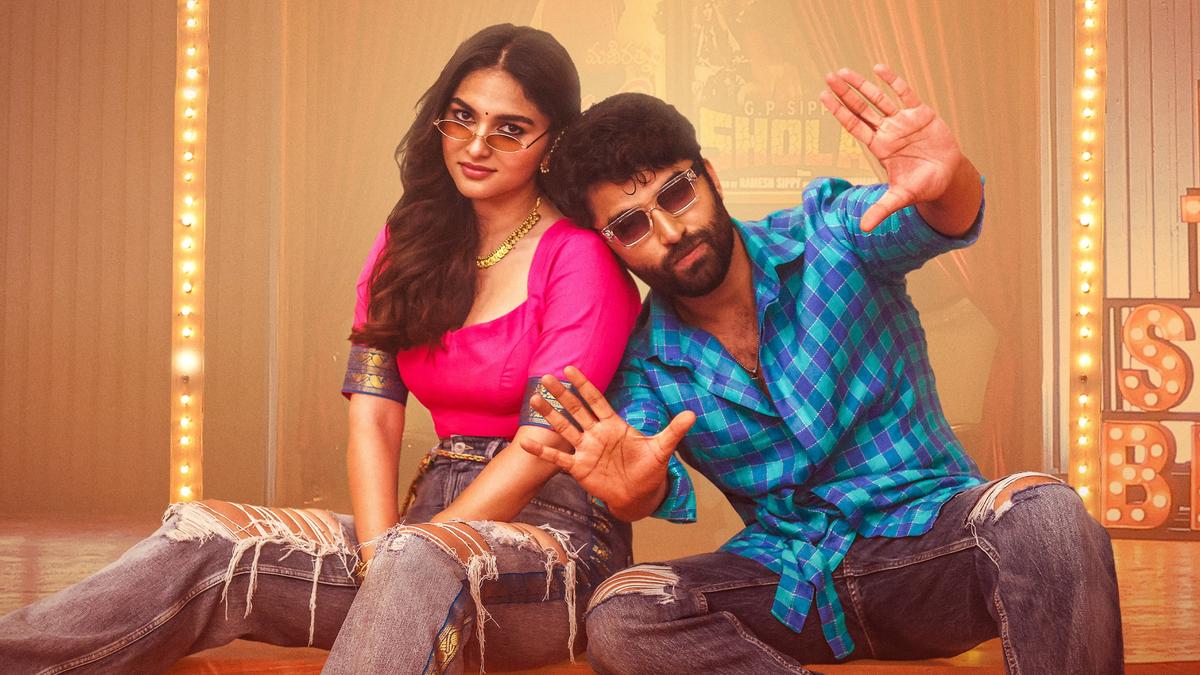- March 8, 2024
‘Gaami’ movie review: Director Vidyadhar Kagita’s Telugu film starring Vishwak Sen is an immersive soul-searching journey

Vishwak Sen and Chandini Chowdary in the Telugu film ‘Gaami’, directed by Vidyadhar Kagita
| Photo Credit: Special Arrangement
‘Dedicated to the crowd’, reads one of the title credits of the Telugu film Gaami (seeker). For the uninitiated, the film began as a crowd-funded indie venture before a reputed production house (UV Creations) threw its might behind it. Gaami was in the making for more than seven years as its makers — debut director Vidyadhar Kagita and producer Karthik Sabareesh — took several leaps of faith to narrate a story that is not within the ambit of conventional Telugu cinema. Watching the film on one of the largest screens in the country, I am glad to state that the result is an immersive slow-burn film that offers plenty to unpack in terms of its narrative and technical finesse that translates into a visually rewarding experience. While Vidyadhar makes an assured directorial debut, actor Vishwak Sen reaffirms that he can deliver an internalised, poignant performance even when he has very little to say.
Gaami (Telugu)
Director: Vidyadhar Kagita
Cast: Vishwak Sen, Chandini Chowdary, MG Abhinaya, Harika Pedada and Mohammad Samad
Storyline: An Aghora who cannot feel human touch must go to the Himalayas in search of a cure. The journey turns out to be more than a physical exploration.
That said, it is imperative to add that if one is habituated to the narrative styles of mainstream cinema, watch Gaami with some patience. The wait is worth it and the payoffs, rewarding.
Gaami draws us into the world of its protagonist Shankar (Vishwak Sen) from the word go. In the opening segment, we see the plight of Shankar in an Aghora ashram somewhere in Haridwar. Even as we take in the different elements that have gone into creating the world of the Aghoras (production design by Pravalya Duddupudi and cinematography by Vishwanath Reddy and Rampy Nandigam), we learn what torments Shankar. He cannot feel human touch. The ramifications of living with such a condition, which some of the Aghoras believe is a curse rather than a problem, is tough to articulate. The character’s struggles and his search for identity are gradually revealed by writers Vidyadhar and Pratyush Vatyam.

Almost like a fable, Shankar is told that he has to travel to the Himalayas where the cure lies in mushrooms with medicinal power; which are available once in 36 years. There are more conditions and he has to secure them within a narrow time window.
This is only one part of the story. Gaami presents us with more than an adventure drama on the mighty Himalayas. We are privy to two other parallel stories. The visual textures, colour palette and mood, helped by Naresh Kumaran and Sweekar Agasthi’s music, tonally shift to present us with the gravity of these tales. An illegal medical camp in a remote location uses adolescents as lab rats for experiments as lethal as lobotomy. From this hell hole, an adolescent, referred to as CT-333 (Mohammad Samad), desperately yearns for freedom. Elsewhere, in a hamlet in the Telugu States, a woman (MG Abhinaya as Durga) realises it is tough to shake off her ‘Devadasi’ past and her daughter (Harika Pedada as Uma), too, must run for safety.
Gaami opts for a deliberate pacing of the stories to allow us to empathise with the characters. The narrative is unafraid to use silences to drive home a sense of helplessness, eeriness and self-realisation, as the situation warrants at different points of the narrative.
All the three characters are seekers of freedom. For one, it boils down to breathing fresh air and being able to look up at the vast skies. It is as primal as that. For another, it is the freedom to live without being preyed upon. From the claustrophobia of the medical camp to the vast Himalayas that dwarf humans, the visuals present the varied terrains in vivid detail. There are times when we marvel at the play of warm light contrasting the darkness of an ashram and in other segments, almost feel the hostile terrain on the Himalayas. The use of visual effects, for the most part, works to accentuate the mood. For each step Shankar and Jahnavi (Chandini Chowdary) take on thin ice and fragile glaciers, we are conscious of the dangers lurking ahead.
While the protagonists of the three stories, set in different timelines, are almost cut off from what we would perceive as normal surroundings, Gaami introduces Jahnavi as a contemporary, urban seeker of medicinal miracles. There are scenes in which she is us, the audience, trying to understand Shankar and his search for cure.
As the two ascend the Himalayas, I was reminded of the trek to Doodhkashi in Nag Ashwin’s Yevade Subrahmanyam nearly a decade ago. Only, this is a far more complex story.

Each of the three stories have cliffhanger moments and segments of dismal abyss when all doors seem to close in on them. The gory happenings inside the medical camp (the film is ‘A’ rated) work to make us root for the escape of the characters in the camp. Mohammad Samad and Harika are terrific in their parts.
Towards the pre-climax, it is possible to discern at least some portions of how the tale is likely to unfold. Yet, when it happens, I couldn’t help smiling and also wonder if, unknowingly, Gaami tipped its hat to another Telugu indie film (revealing its name would be a spoiler) that was released a few years ago. On a different note, there is also the spiritual subtext that aligns with Shankar’s name and his search on the Himalayas. As Shankar’s search for a cure turns into a soul-searching exercise, it is impossible to not root for Vishwak Sen’s unwavering performance. The same goes for the characters CT-333 (in the medical camp that is worse than a prison, even name and identity are a privilege) and Uma and we desperately want them to move to safer zones. Chandini’s character, at the outset, might come across as underwritten. However, it ends up beautifully complementing Shankar’s tale towards the end and also answers why destiny chooses some for the cure and not every seeker. In her limited portions, Chandini is effective.
Gaami is a film that is likely to be rewarding with repeat viewing. It is not always on top of its game. For instance, some of the hurdles on the Himalayas don’t always have the desired jaw-dropping effect. But these are minor gripes. This is a brave new Telugu indie that deserves appreciation.





